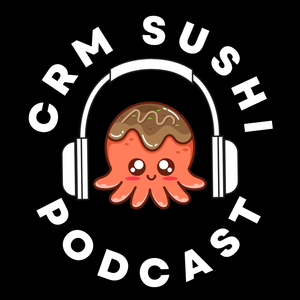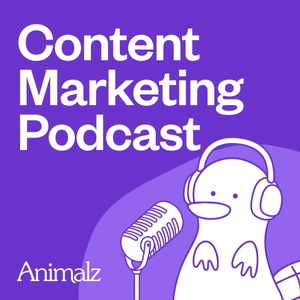
Did Coaching Kill Agile? w Sandra Cain and Jeff Leach
Explicit content warning
06/17/24 • 51 min
Previous Episode

Are you the hero or the villain in your team? w Carl Smith and Jesse Wroblewski
Summary The conversation explores the concept of being a hero or a villain in a team and how awareness of one's role can lead to more intentional actions. The guests, Jesse and Carl, share their perspectives on this topic. Jesse discusses his experience running an agency and how he developed a marketing approach for supervillains. Carl talks about his role at the Bureau and the challenges of being a leader. They also discuss the importance of empathy and self-reflection in avoiding villainous behavior. The conversation highlights the need for leaders to be aware of their actions and the impact they have on others. They also explore the challenges of leadership and self-awareness, particularly in relation to the younger generation. It delves into the importance of difficult conversations, honest feedback, and effective reward systems. The fear and pressure of being in a position of power are discussed, along with the potential for toxic leadership. Strategies for improving self-awareness include having a coach, seeking unfiltered feedback, and using AI tools. The concept of decommoditization is introduced as a way to differentiate oneself in a competitive market. The conversation concludes with a discussion on the supportive and inspiring nature of the Bureau community. Takeaways • Being a hero or a villain is subjective and depends on the perspective of others. • Leaders should be aware of their actions and the impact they have on their team. • Empathy and self-reflection are important in avoiding villainous behavior. • True communication and understanding can help build stronger relationships within a team. Difficult conversations and honest feedback are crucial for effective leadership. • Fear and pressure can lead to toxic leadership, and it's important to find healthy ways to manage negative energy. • Having a coach and seeking unfiltered feedback can help improve self-awareness. • Decommoditization is a strategy to differentiate oneself in a competitive market. • The Bureau community is a supportive and inspiring network for professionals. Chapters 03:23 This dude is like Batman...I'm somebody's Joker 07:50 When you think you're a hero, but maybe you're a villain 10:40 The 3 brains in side every organization 11:05 Being conscious of an advanced perspective 13:53 Knowing when you've slipped into villain mode 20:36 Ways to increase your level of self-awareness 26:35 Decommoditization: Differentiating Yourself in a Competitive Market 31:24 The Supportive and Inspiring Nature of the Bureau Community Jesse's book Web: https://marketingforsupervillains.com Amazon: Marketing for Supervillains https://tinyurl.com/59tkjs39 Contacting Jesse Web: https://decommoditized.com LinkedIn: https://www.linkedin.com/in/jesse-wroblewski/ Contacting Carl Web: https://bureauofdigital.com LinkedIn: https://www.linkedin.com/in/carl-w-smith/
Next Episode

Thr Art of War with Si Alhir
Summary In this conversation, Si Alhir and Dave discuss the Art of War, its application in transformation work, and the naturalness and unity found within its wisdom. They explore the concept of taking whole, the relationship with the environment, and the role of the Sage Commander. Si shares personal experiences and insights, emphasizing the transformative power of the Art of War. The conversation delves into the concept of enlightened leadership and the application of the principles from 'The Art of War' in organizational transformation. It explores the distinction between an enlightened ruler and a wise general, the importance of psychological safety, and the shift from a vicious ego-based reality control cycle to a virtuous eco-based reality navigation cycle. The conversation concludes with a powerful story of using the ordinary and the extraordinary to transform toxic organizational dynamics. Takeaways • The Art of War is a transformative wisdom that emphasizes naturalness and unity in its application. • The concept of taking whole and the relationship with the environment are key elements of the Art of War's wisdom. • The role of the Sage Commander involves patience, relaxation, and an understanding of the natural flow of time and energy. • Leadership power lies in the individual's ability to navigate the world around them, working with the environment as a partner. • The Art of War offers tools for practice and learning, requiring a mindful and respectful approach to its application. Enlightened leadership requires awareness and mindfulness in navigating the nature of things. • Psychological safety should focus on building strong individuals to interact in an unsafe world. • The application of 'The Art of War' principles can lead to successful organizational transformation. • The distinction between the vicious ego-based reality control cycle and the virtuous eco-based reality navigation cycle is crucial for effective leadership. • Using the ordinary and the extraordinary can transform toxic organizational dynamics. Titles • Tools for Practice and Learning in the Art of War • Exploring the Transformative Wisdom of the Art of War Transforming Toxic Organizational Dynamics • Navigating Psychological Safety and Reality in Leadership Chapters 00:00 Preroll Intro 02:33 Introduction to the Art of War and Transformation Work 13:42 The Concept of Taking Whole and Unity 29:21 Navigating the Environment as a Partner 33:03 Tools for Practice and Learning 34:05 Enlightened Leadership and 'The Art of War' in Organizational Transformation 36:56 Navigating Psychological Safety and Reality in Leadership 43:43 The Shift from Vicious Ego-Based Reality Control to Virtuous Eco-Based Reality Navigation 59:39 Transforming Toxic Organizational Dynamics The Art of War in the Wild (May 2024) Panel #1 - Brad Barton, Mark Ferraro, and Si Alhir https://lnkd.in/emmnxQut Panel #2 - Cynthia Chambers, Christine Ferraro, and Holly Fiorello https://lnkd.in/eZNX6mJB Panel #3 - Chris Herring, Cynthia Chambers, and Mudasir Ahamed https://lnkd.in/ed3kyMUB Panel #4 - John Cherian., Chris Herring, and Dave Prior https://lnkd.in/eXB7Mm5x Si's Books on Amazon https://tinyurl.com/6rjvkucw Contacting Si LinkedIn: https://www.linkedin.com/in/salhir/ Dave's Links Dave's upcoming classes: tinyurl.com/u2vh9zh8 The Art of War for Collaboration: modusinstitute.com/course/art-of-war-collaboration Contacting Dave: linktr.ee/mrsungo
If you like this episode you’ll love
Episode Comments
Generate a badge
Get a badge for your website that links back to this episode
<a href="https://goodpods.com/podcasts/agile-and-project-management-drunkenpm-radio-15478/did-coaching-kill-agile-w-sandra-cain-and-jeff-leach-54701982"> <img src="https://storage.googleapis.com/goodpods-images-bucket/badges/generic-badge-1.svg" alt="listen to did coaching kill agile? w sandra cain and jeff leach on goodpods" style="width: 225px" /> </a>
Copy




